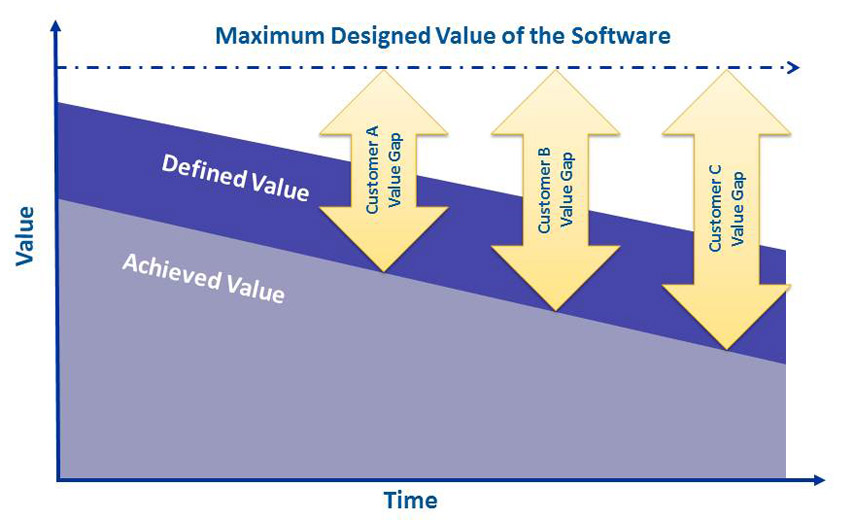I often pose these questions to senior executives from software companies and their reaction is invariably quite amusing.
If they were to ship the identical software to three different customers, would the customers have achieved totally different value from the same software if we went back two years later? If so, why is that, given that all three received the same exact software? And would any of them have achieved the intended value from the software?
Let me illustrate my point. Let’s say the software is designed with 100 units of value. Of the three customers, will any of them achieve the 100 units? If not, why not? The second question is why do all three achieve different units of value from the same exact designed value (100 units)? Let’s assume that customer A achieved 80 units, customer B achieved 70 units and customer C achieved 60 units.
The value gap of 20, 30 and 40 units is caused by the Adoption and Implementation of the software and clearly not because of the software itself. Yet, the gap is often blamed on the software itself because most organizations fail to grasp the importance of Adoption and Implementation. Customer C could easily have made sure that they achieved more than the 60 units had they done at least as good a job as B or A. And what’s even more interesting is that the software companies keep making enhancements to their product, thus increasing the designed value from 100 units to 110 to 120 and so on. What they fail to realize is that by doing that, they are actually increasing the value gap unless they are also focused on helping their customers increase the achieved value, which has very little to do with the software.
Let me use another example. How much of the designed value of a smart phone is actually achieved by the average user? Would you be shocked if I told you it’s in the single digits? And by the way, the phone companies keep adding to the designed value every six months and therefore keep increasing the value gap. Steve Job’s genius was in focusing on how customers were actually going to use the product and get the most value out if it. He clearly recognized the importance of the ”vowels” which actually help reduce the value gap and not the “consonants” which do nothing but increase the value gap.
This simple yet powerful concept needs to be recognized by the software companies so that they can focus on the achieved value and not the designed value. If they do that, it will actually have a significant impact on how they enhance and design their products. All future enhancements will be focused on reducing the value gap and increasing the achieved value. Increasing the designed value and not doing anything about the Adoption and Implementation will only increase the value gap.
The same applies to any solution that you are working on. Developing the best Supply Chain strategy or the best contract with a supplier is the designed value. The achieved value has to do with Adoption and in reality a sub optimum contract may actually deliver more achieved value for the organization because it focus on the vowels thus reducing the value gap.



23 Comments
Pingback: Actions Speak Louder than Words or Do They? | News You Can Use
Pingback: News You Can Use | Strategic Competencies are more important than Functional Competencies!! What’s the news here?
Pingback: Is your Organization Trapped in the Fear Zone? - News You Can Use
Pingback: Too Many Suppliers . . . Keep Looking! - News You Can Use
Pingback: Adoption of Innovation: 3rd World Ahead of Advanced Economies? - News You Can Use
Pingback: When In Doubt, You Can Always Find Answers in Shakespeare - News You Can Use
Pingback: Lobster or Chicken for Dinner Tonight? - News You Can Use
Pingback: Frugal Innovation or Engineering “down” - News You Can Use
Pingback: From abC to Xyz to Extinction . . .One Can Only Hope! - News You Can Use
Pingback: Procurement is the Culprit Behind Healthcare.gov? - News You Can Use
Pingback: Run to Your Local Zoo As Fast As You Can!!! - News You Can Use
Pingback: Where’s the Glue? - News You Can Use
Pingback: Increase your Adoption Rate - Shop YOUR Closet! - News You Can Use
Pingback: January is Almost Over – “Shop” your way to a Fresh Start - News You Can Use
Pingback: The Next Amazon Killer?? Or, How Much Mustard can you Eat? - News You Can Use
Pingback: Would You Be Prepared If... - News You Can Use
Pingback: Risk Management and Public Policy – Impact on Energy Sector - News You Can Use
Pingback: Stop Being Frustrated . . . . - News You Can Use
Pingback: Doing Nothing Can Be Riskier Than You Think - News You Can Use
Pingback: Category Management – The Discussion Continues……..
Pingback: Do you Know the difference between Strategic Sourcing and Category Management – How Many Chevrons are in your Process? - News You Can Use
Pingback: Do you Know the Difference between Strategic Sourcing & Category Management ? Process and Information Management & Technology - News You Can Use
Pingback: Do You Know the Difference Between Strategic Sourcing and Category Management – What is Value? - News You Can Use